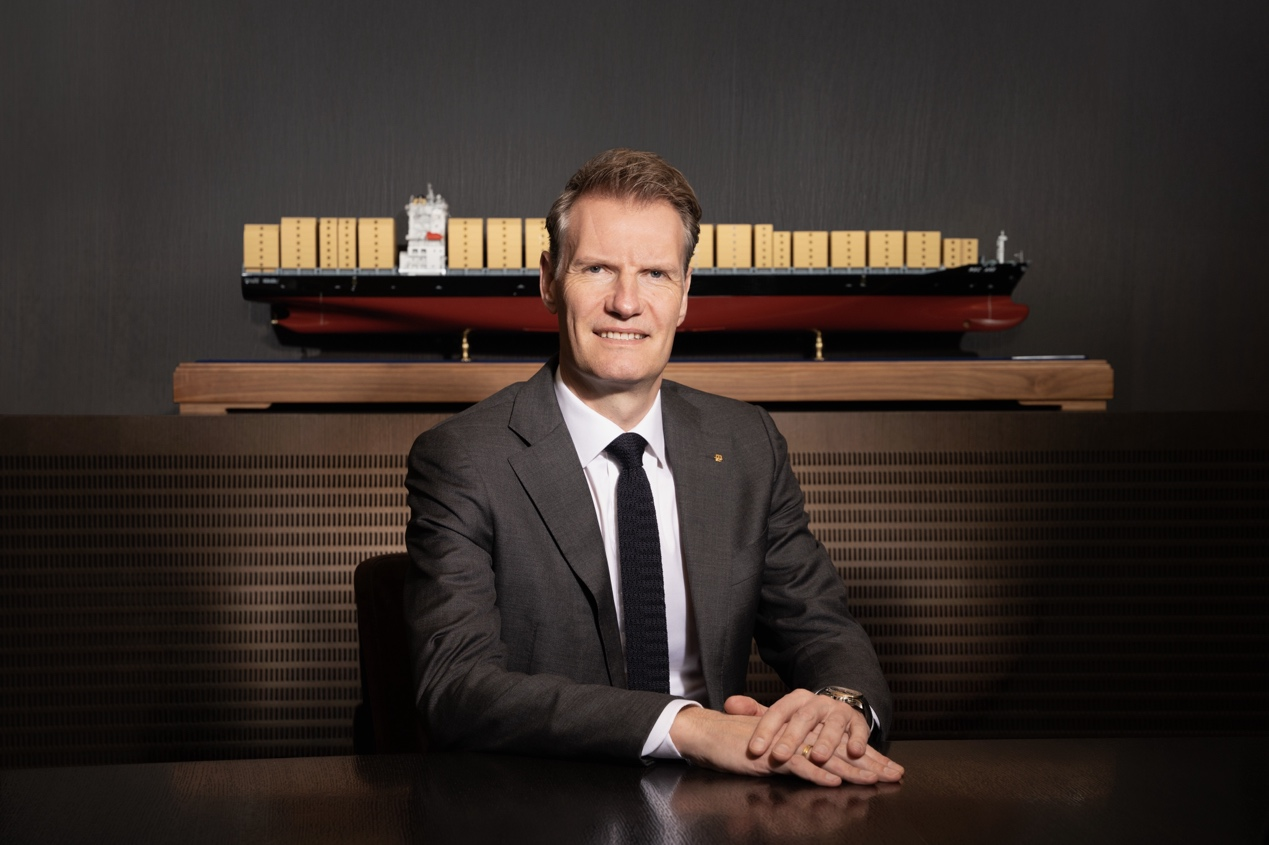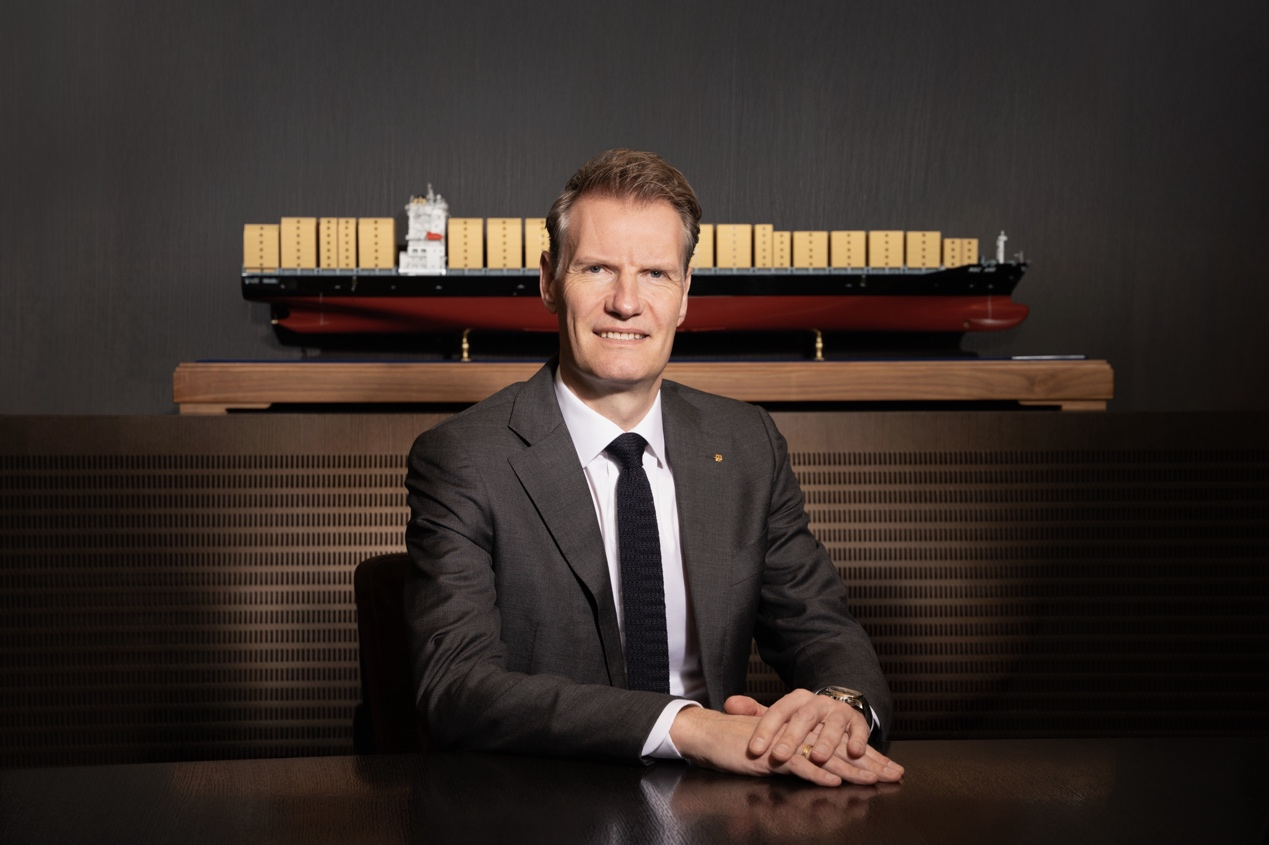BEIJING, Nov. 19 (Xinhua) -- As a global leader in container shipping, MSC Mediterranean Shipping Company (MSC) continues to place the Chinese market at the core of its global strategy, advancing both its digital transformation and decarbonization initiatives amid the restructuring of global supply chains and the accelerating digital wave.
In an exclusive interview, MSC Chief Executive Officer Soren Toft emphasized that digital transformation should focus not only on improving efficiency, but even more on enhancing customer experience. He further noted that in the shipping industry's journey towards decarbonization, liquefied natural gas (LNG) remains a key transitional solution, one that can gradually evolve from LNG to bio-LNG, and eventually to synthetic LNG.

MSC Chief Executive Officer Soren Toft (Source: MSC)
-- A shared mission to "connect the world"
MSC's relationship with China dates back decades. In 1996, the company launched its first service to China -- the Silk service, named in homage to the ancient "Silk Road," symbolizing friendship and exchange through maritime trade. Since then, MSC has been shaping a story of passion and ambition in China.
2025 marks the 27th anniversary of MSC's official entry into the Chinese market. Over the years, MSC has continuously expanded its footprint, optimized its service network, increased investment, and deepened cooperation with numerous Chinese ports and leading enterprises, driving mutual growth through collaboration and strategic alignment.
Citing the China International Import Expo (CIIE) as an example, Toft remarked that China continually demonstrates the importance of openness and exchange with the world. He believes China's proactive efforts to promote global trade openness align closely with MSC's mission of "Connecting the World."
MSC has been expanding and optimizing its global service network including those connecting with China. In February 2025, the company launched a standalone East-West network, offering Chinese customers trade services covering five major trade regions -- Asia-North Europe, Asia-Mediterranean, Asia-U.S. East Coast, Asia-U.S. West Coast, and Transatlantic routes.
As global politics, economics, and technology reshape supply chain dynamics, Soren Toft noted that the global supply chain is undergoing a profound shift toward diversification and regionalization.
"Diversification"means reducing dependence on a single sourcing country, while "regionalization"emphasizes strengthening intra-regional trade and building relatively independent supply systems. "Western countries will still rely on overseas production, while China is expanding its trade with India, the Middle East, Africa, and Latin America. Supply chains are becoming more diverse and distributed," Toft explained.
Today, MSC operates over 30 offices across Greater China, serving more than 20 ports, with nearly 40 mainline trade services and over 10 intra-Asia trade routes, continually enhancing China's connectivity with global markets.
Recently, MSC has also extended its collaboration in China into the aviation sector. MSC Air Cargo signed a strategic cooperation memorandum with Shanghai Airport Group, aiming to make Shanghai one of its gateways in Asia-Pacific. From Pudong International Airport, MSC will operate intercontinental cargo routes connecting China with Europe and North America, helping build a more efficient global air logistics network and supporting Shanghai's vision of becoming a world-class international shipping center.
-- Continuing the drive toward digitalization and sustainability
The transformation of global shipping toward digitalization and sustainability represents both a major trend and a historic opportunity.
Shipping carries more than 80 percent of global trade volume, but it also accounts for significant carbon emissions. According to the International Maritime Organization (IMO), the shipping industry emits around 1 billion tons of CO2 annually, representing about 3 percent of global CO2 emissions.
In terms of decarbonization, Toft emphasized that while IMO's global decarbonization regulations are still being discussed, the entire sector has already made substantial progress.
He noted that approximately 7 million TEUs of the world's fleet capacity now consist of dual-fuel vessels, with around 70 percent powered by LNG. MSC has ordered over 150 dual-fuel ships, with 60 vessels already in operation.
"LNG remains an important transitional solution since we can move from LNG to bio-LNG, and eventually to synthetic fuels," said Toft. He added that MSC has also signed strategic cooperation agreements with Chinese enterprises to ensure the safety and sustainability of the company's fuel supply chain.
Since 2023, MSC has signed LNG bunkering agreements with major Chinese ports, including Shanghai International Port Group, to support the transition to cleaner marine fuels. At the same time, the company actively promotes shore power usage to reduce emissions while vessels are docked, making MSC one of the largest users of shore power in China.
At the 2025 North Bund Forum, MSC joined efforts to develop green shipping corridors, including Ningbo-Le Havre and Qingdao-Hamburg, demonstrating its strong commitment to global maritime decarbonization.
On the digital front, MSC's digitalization strategy is as much about enhancing human experience as it is about improving operational efficiency. "We aim to make it easier for customers to do business with us -- from our website to customer service systems -- while also ensuring that clients have the flexibility to interact beyond digital channels," Toft explained.
As a founding member of the Digital Container Shipping Association (DCSA), MSC announced in February 2023 its commitment to achieving 100 percent electronic bill of lading (eBL) adoption by 2030.
Toft emphasized that "digitalization must go hand in hand with human interaction." For digitally savvy customers, MSC provides comprehensive online services, while for those who prefer direct contact, traditional communication channels remain open. "When disruptions occur -- such as vessel delays or port strikes -- human connection remains irreplaceable," he noted.
In China, MSC has rolled out a comprehensive suite of digital solutions, including e-business platform myMSC, eBL, smart containers, and the MSC iReefer solution, the most advanced reefer container tracking and monitoring system, to enhance transparency, efficiency, and control throughout the shipment process.
Launched in April 2021, the MSC eBL solution provides customers with a safer, faster, and more sustainable alternative to traditional paper-based processes. Currently, China has become MSC's largest eBL market worldwide. "China is an advanced market, and its customers are increasingly embracing digitalization," Toft said. He added that MSC adheres to the principle of "global standards, locally adapted" to ensure each market's digital experience aligns with local regulations and customer needs.
(Contributed by Ge Jiaming)




 A single purchase
A single purchase









